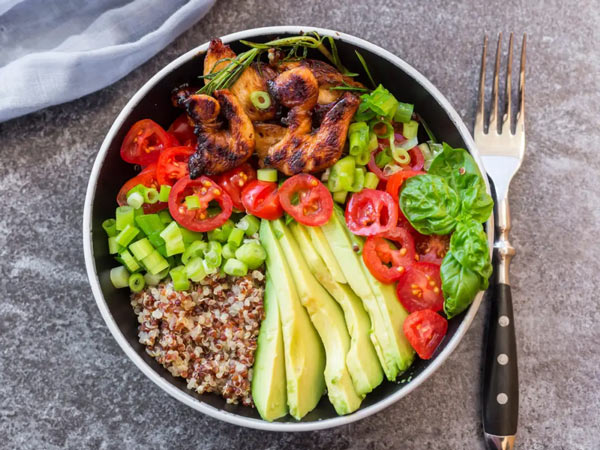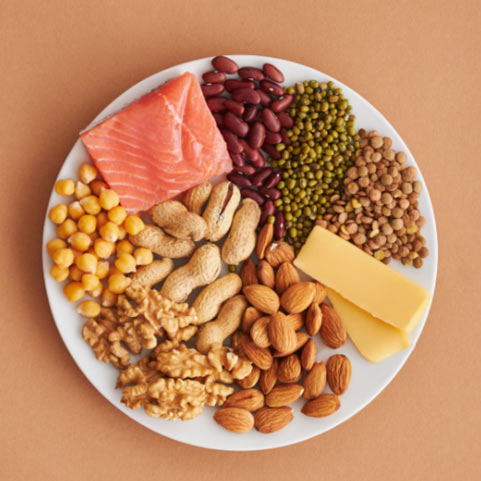Prepping for Success: Meal Prep Ideas for Post-Workout Nutrition
Dec 14, 2023 By Nancy Miller
Nutrition post-workout is one important element in any workout plan. What you choose to eat after exercising is important because it contributes to recovery, muscle growth, and overall performance. The role of post-exercise nutrition—that is, what to eat and when to consume it—will be the main topic of discussion in this blog article.

Understanding the Importance of Post-Workout Nutrition
Muscle Recovery and Growth
The muscle recovery process, which occurs after intensive exercise, leads to muscle growth, which is quite complicated. Such microscopic damage occurs in your muscles when you perform strenuous exercise that could be strength training or a high intensity workout. As a result, the body repairs itself and adapts to enhance stronger and more flexible muscles. Nevertheless, an optimal manifestation of this process depends on appropriate nutrition. Nutrients that you consume after working out are building blocks of muscle repair and growth.
Muscle recovery has been found to be mostly dependent on protein, particularly at this point. These essential amino acids are needed for protein synthesis, thus facilitating the recovery of torn muscles. Carbohydrates also contribute significantly towards glycogen stores regeneration as their main energy source for working muscles during exercise. These nutrients work in combination and aid in the repair process by minimizing pain and inflammation within the muscles thereby shorting the recovery duration. As a matter of fact, post-workout nutrition acts as a stimulus for muscle recovery and provides the necessary energy for the body to rebuild itself after exertion during a workout session.
Replenishing Energy Stores
When you engage in intense exercise, the body uses up a lot of its energy stores, especially glycogen, which is the primary source of muscle energy during physical activities. Endurance and power are sustained through stored glycogen, which is a complex carbohydrate kept within the muscles and livers. However, continuous or intensive workout leads to the lowering of these glycogen stores, which must be replenished to enable effective workouts after this period.
Refilling glycogen stores in athletes and persons who engage in physical workouts is a very important process. To achieve this, it is essential to consume the appropriate carbohydrates after exercise. Glucose, resulting from the breakdown of carbohydrates, serves to replace levels of glycogene in muscular tissues. Replenishing your energy stores during the workout is essential as it helps reduce fatigue and improves your overall performance during the workout.
In addition, selecting appropriate types of carbohydrates, like complex carbohydrates obtained from whole grains, fruits, and vegetables, also maintains energy levels and facilitates a delicate relationship that exists between nutrients and performance in fitness aspiration. Strategic carbohydrate intake after a workout then becomes one of the most important components of an ultimate strategy aimed at preserving glycogen stores and deriving maximum advantage out of regular physical activities.
Protein Synthesis
Synthesis of protein is a basic biological function necessary for muscle recovery, maintenance, and development. Amino acids compose proteins and are commonly known as the body's building blocks. Post-exercise recovery revolves around protein synthesis as a response to the micro tears inflicted on these muscle fibers during exercises.2. The process of the repair ensures that the strength and endurance build up over a period of time since they provide integrity to the muscles.
After exercise, the body becomes more sensitive to nutrients, and this sensitive state offers an optimal window for promoting protein synthesis. Supplying the necessary amount of amino acids for the construction of new proteins is achieved by consuming enough amount of protein during this time. As the recovery phase begins, these amino acids serve as building blocks for repairing and rebuilding muscle tissues.
This protein comes from different sources, either animal or plant-based, for instance, lean meat, dairy products, eggs, legumes, and protein supplements like whey and plant-based protein powder become a vital part of the plan for deriving the maximum effect of exercise. First, eating protein after working out promotes the creation of new proteins that aid in muscle growth and adaptability, as well as the healing of injured muscles.
What to Eat After a Workout
Protein-Rich Foods
Lean meats (chicken, turkey, fish)
Eggs
Greek yogurt
Cottage cheese
Plant-based protein sources (tofu, lentils, chickpeas)
Carbohydrates
Whole grains (brown rice, quinoa, oats)
Fruits (bananas, berries, oranges)
Sweet potatoes
Legumes (beans, lentils)
Vegetables (leafy greens, broccoli, carrots)
Healthy Fats
Avocado
Nuts (almonds, walnuts)
Olive oil
Fatty fish (salmon, mackerel)
Chia seeds
Hydration
Water provides an optimum recovery process. Do not allow dehydration, which may hamper recovery as well as performance; replenish the fluids lost via sweat during your workout.
When to Eat After a Workout: Timing Is Important
The Anabolic Window
The "anabolic window" has been used in the discourse on post-exercise nutrition, which refers to a critical period in which nutrients are absorbed to build up muscles. It is assumed that a short duration of time immediately after exercising could be a critical window during which food consumption will strongly stimulate the recovery of muscles as well as their growth. Although recent studies have refined this concept, there is still consensus that timely intake of nutrients post-workout may increase the body's adaptive response to training.
The anabolic window is normally for about half an hour and two hours after the workout. The body becomes more insulin sensitive and is presumed to take up nutrients, especially carbohydrate and proteins, by muscles during this time.
Having a balanced meal or snack made of simple carbohydrates and easy-to-absorb proteins during this time period helps replenish the glycogen, increasing the rate of muscle protein synthesis and recovery. Even though some people may argue that the level of importance of post-workout nutrition may vary depending upon personal factors such as the intensity and duration of workouts and an individual's overall dietary practices, most fitness experts suggest that nutrients should be taken within four hours after a workout, which proves In conclusion, it emphasizes the importance of planned nutrient timing as part of the post-workout diet.
Pre- and Post-Workout Meals
Pre-Workout: Eat a balanced meal with a high content of carbohydrates and proteins two to three hours before exercising.
Post-Workout: Within an hour of the workout, try to have some protein and carbohydrate mix.
Individual Variability
Timing suggestions are usually based on the specifics of each individual, including the intensity, length, and personal preferences of the workout. Try on various timing strategies to see what suits you best.

Sample Post-Workout Meal Ideas
Grilled Chicken Salad:
Grilled chicken breast
Mixed greens
Cherry tomatoes
Quinoa
Olive oil dressing
Protein Smoothie
Whey or plant-based protein powder
Banana
Greek yogurt
Almond milk
Handful of spinach
Salmon and Sweet Potato
Baked salmon fillet
Roasted sweet potatoes
Steamed broccoli
Olive oil drizzle
Whole Grain Wrap
Whole grain tortilla
Turkey slices
Hummus
Spinach
Sliced cucumbers
Conclusion
Post-workout nutrition is an integral part of a full-fledged fitness program. You should understand the need to replenish your nutrients, eat the proper food, and take into account timings to maximize recovery and increase muscle growth and performance. Experiment with various foods in a post-workout nutrition regime and their timing patterns to get to know what suits your body best and matches your fitness objectives. Please note that consistency is important. In addition, it is advisable to make informed decisions after every workout. It is essential for the success of your health and fitness goals.







